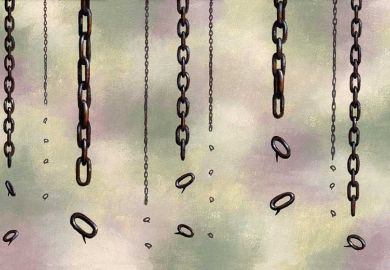UCL’s Centre for the Study of the Legacies of British Slave-ownership (LBS) has already proved crucial in showing just how deeply the legacy of slavery shaped British history and society. Matthew Smith (pictured), who will arrive as its next director in the spring, leaving his current post as professor of history at the University of the West Indies, has an agenda not just to continue illustrating “how closely connected the institution of enslavement was to the development of the UK” – something with pressing implications for many universities today – but to forge new links with slavery researchers in the Caribbean.
At the heart of the LBS is a database of those who claimed compensation when slavery was abolished in most of the British Empire in 1833. “One of the things the LBS has done extremely well,” said Professor Smith, “is following the trail of the compensation money, where it went and how that directly tied to the development of businesses, enterprises and families across the UK."
Although he did not see it as the role of the centre to decide on “questions of reparations and who they go to”, Professor Smith went on, its database provided a crucial resource for those pursuing reparatory justice – or who wanted to hold to account institutions such as universities built on support from philanthropic sources tainted by slave ownership – by “presenting hard evidence you cannot look away from”.
Yet, while pursuing its efforts in this crucial area, Professor Smith also hoped to develop the work of the LBS in other directions. His own research has focused on “colonial Jamaica and the connections with regional developments in the post-slavery Caribbean”, including Haiti and Cuba. He was therefore keen to pursue what has been described as “reparatory history”, designed to “reclaim the history of exploitation and what that means and has meant historically for people who are descendants of the enslaved”.
We need to look in greater detail, for example, at what abolition meant for “colonial administration post-slavery” and “the development of political power and prestige” as well as “the decline in sugar production” and “the history of underdevelopment in the Caribbean”, Professor Smith argued. It should also prove valuable to explore the long-term impact of “the denial of the welfare of the formerly enslaved” (while their owners were compensated), he added.
As an example of how the LBS material could illuminate Caribbean social history, Professor Smith mentioned a public workshop that he coordinated at the UWI in 2015. In the audience was “the descendant of a French planter from [what is now Haiti] whose family had come to Jamaica during the revolution [1791-1804]. They had claimed indemnity from the French in 1825 but, since they owned a plantation in Jamaica, they also claimed British planters’ compensation – and their name appeared in the database,” he said. Such a “double claim from the same family” helped illuminate “questions of power and political administration”, he continued.
One of the key elements in Professor Smith’s agenda is building new links with researchers in the Caribbean itself.
Although “the history of enslavement is one of the strongest areas of scholarship in Caribbean historiography”, Professor Smith explained, there was a tendency for researchers to “use the material most easily available to them, local archives and so forth”.
This included “newspaper reports, manuscript reports, archival reports” that were largely undigitised but could be brought into dialogue with a second LBS database covering the development of estates in the British Caribbean from 1763 to 1833, he said. Although the slaves themselves inevitably represented “a rather minor voice in the data”, it should still be possible to “get a deeper sense of what life was like for the people enslaved”, he added.
Since Professor Smith has taught in the Caribbean for 18 years and so has “strong connections”, he also hoped to build on earlier UCL initiatives and promote student engagement with the centre by “developing virtual classrooms right across the Caribbean”.
Even the recent history of migration from the Caribbean to the UK, in Professor Smith’s view, could be seen partly as “coming out of 19th-century developments regarding colonial administration of the islands”.
The LBS, he added, was well placed to “facilitate discussion of really important questions” around “the legacies of British slave ownership, what they are in the 21st century, how Caribbean populations think about the history and whether it’s part of their own history. All this material is not simply for the creation of future databases, books and monographs but also for deepening our understanding of slavery’s many ramifications and impacts across the spectrum of Caribbean and UK history.”
POSTSCRIPT:
Print headline: On a quest to explore ‘reparatory history’
Register to continue
Why register?
- Registration is free and only takes a moment
- Once registered, you can read 3 articles a month
- Sign up for our newsletter
Subscribe
Or subscribe for unlimited access to:
- Unlimited access to news, views, insights & reviews
- Digital editions
- Digital access to THE’s university and college rankings analysis
Already registered or a current subscriber?








